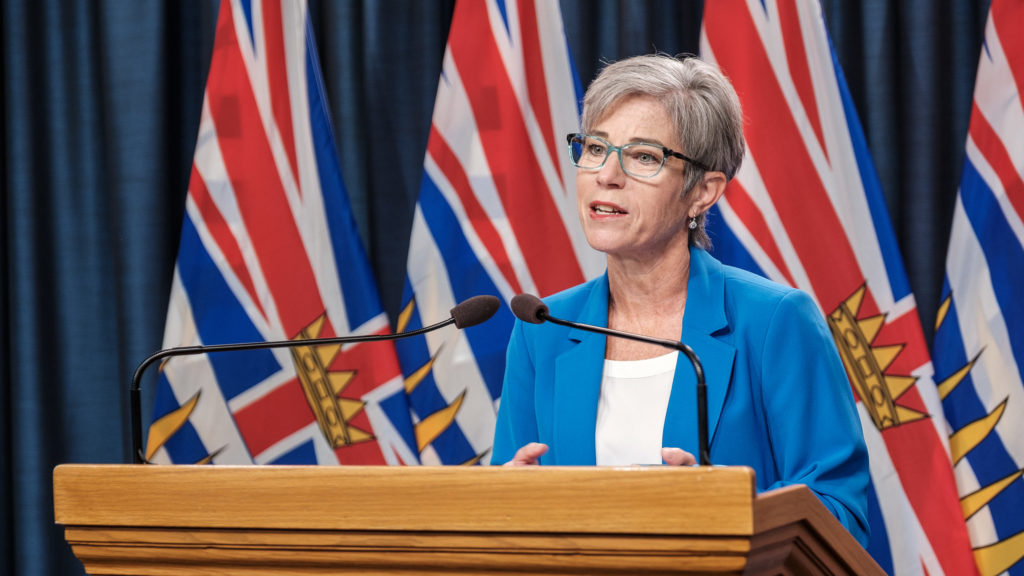
B.C. will spend big on pandemic and natural disaster efforts all while slipping further into debt.
The provincial government unveiled its annual budget and three-year fiscal plan on Tuesday, allocating $27.4 billion to capital spending over that time, including $3 billion for pandemic recovery and $2.1 billion on natural disaster recovery and prevention efforts.
Significant expenses include $3.2 billion in health-care spending, $6.38 billion on provincial transportation infrastructure, $633 million for dealing with homelessness, and $644 million on education, over the course of the three-year fiscal plan. The budget also includes a commitment to bring licensed child care fees to $20 per day by the end of 2022 for a cost of $118 million.
All that spending will come at a cost, though, as the province is projecting a $5.46-billion deficit for the 2022/2023 fiscal year and future deficits of $4.18 billion and $3.18 billion in the following years.
B.C. Finance Minister Selena Robinson said it has been a difficult time around the globe, citing the pandemic and climate change natural disasters. She also said $27.4 billion in planned capital spending, which includes no new major infrastructure projects for Vancouver Island, is necessary.
“It’s capital spending that needs to be done,” she said. “Right now, we know we need hospitals, we know we need schools. For right now, it makes sense to be spending on these projects.”
As a result, the province’s taxpayer-supported debt-to-GDP ratio is slated to climb to 20 per cent this year – up more than three per cent from the previous fiscal year – and will further increase to 22.8 per cent by 2024/2025.
The interest rate on the taxpayer-supported debt is also expected to climb to as high as 3.7 per cent by 2024/2025, which is still considerably lower than the 7.7 per rate in 1996/1997.
Although the Bank of Canada has not formally increased interest rates, Robinson said she fully expects interest rates to climb.
The budget also includes revised figures for the 2021/2022 fiscal year, which show that the deficit is now $61.7 billion, a $10-billion decrease from what the provincial government previously forecasted. It also shows that government revenues were $8 billion higher than initially forecasted, with property tax revenues coming in at more than 1 billion higher than expected.
The Opposition B.C. Liberal party criticized the budget for not doing enough to cut the cost of living.
“From the absence of measures to meaningfully address the rising cost of housing, gas and groceries, to the lack of progress on affordable child care, and the continued underfunding of needed mental health and addictions supports, Budget 2022 completely misses the mark,” said Peter Milobar, the party’s finance critic.
“People are looking to the NDP government to solve these problems because they repeatedly promised they would.”
B.C. budget highlights
COVID-19 Recovery
- $2 billion in funding for pandemic recovery contingencies in 2022/2023, including $875 million for COVID-19 health management
Health care
- $303 million over three years to reduce surgical and diagnostic wait times
- $148 million over three years to reduce ambulance wait times
- $57 million to increase urgent and primary care centres
Child care
- $284 million to reduce average fees by 50 per cent
- Average child care fee by
Disaster recovery
- $1.5 billion over three years to address disaster/recovery efforts
- $800 million for flooding recovery in 2022/2023
- $145 million over 3 years for wildfire and emergency management
Education/Housing/Homelessness
- $3.1 billion over three years for new schools and seismic upgrades
- $229 million to construct two new student housing buildings at University of Victoria (621 net-new beds)
- $600 per month rent subsidies for 3,000 people by 2024, some funding from federal government.
- $164 million for at least 20 complex care sites in B.C.
Other
- $310 million to support decarbonization of industry over three years
- $233 million for public safety initiatives and “wage enhancements” for the RCMP
- $125 million for clean transportation over three years
- $112 million compensation for forestry workers, retraining and retirement bridging
- $48 million over three years for BC Transit and BC Ferries
- $46 million over three years to improve access to justice services
With files from the Canadian Press




